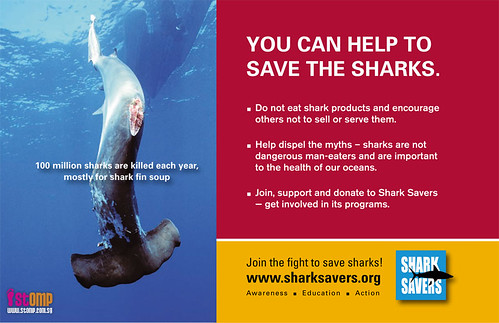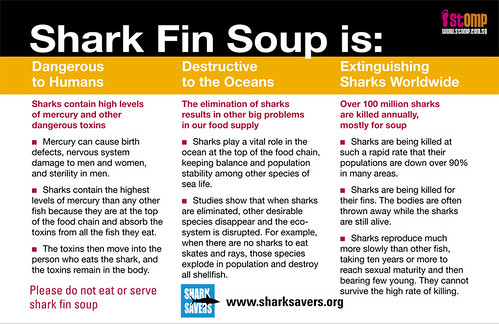
A STOMPer, who is about to get married, urges all couples to serving shark's fin soup at their wedding dinner, after learning of the ill effects of shark-killing, both on ecosystem and the economy.
She said:
"I am a bride to be in Jan 2010. Initially I am just concerned about my own wedding dinner for not having shark fin soup as an act of protecting sharks.
"But after reading forums, magazines, joining talks and fairs, I realised that there are many couples getting married these years.
"I feel that this message should be sent to them as an average of 30~40 tables per couple, the statistics of sharks going to sacrifice (which I do not know), but I am sure that this amount will be substantial."
The STOMPer says she has contacted an agency called Sharksavers and highlighted to them as well as suggested them to do something in Singapore.
She told STOMP:
"They are actually working out things on similar topic which is not having shark fins during Asian dinner and feel I am able to help.
"Currently I am working with sharksavers.org as a volunteer in Singapore on conveying the message of not having shark fins during wedding dinner.
"We found out that young couples are more in tune with current environmental issues and wish to do the right thing, but are under pressure from their parents and elders to 'keep up appearances' and maintain the culture.
"Unfortunately, the sharks cannot wait for our generation to become the elders of tomorrow; we all need to make the right and honorable choices now."




I applaud this person for taking action in trying to change deeply-entrenched mindsets; sadly, people who take such bold steps are likely to face criticism from many quarters.
If you're interested, here is the Shark Savers site. Other groups campaigning to increase protection for sharks and to alleviate the pressure on dwindling populations include The Shark Alliance and Iemanya Oceanica, while locally, there is lovesharks.sg.
The signs are encouraging; a recent article says that there is a growing trend to leave sharksfin off the menu at wedding banquets, when this article from May 2008 reported a huge spike in sharksfin consumption in 2007.
Honestly, I fail to see why sharksfin is still considered an essential dish for wedding dinners; all pretense of the dish being a symbol of prestige and wealth was chucked out the window when anybody could buy canned sharksfin at the supermarket, or buy bowls of sharksfin soup at the pasar malam.
We are all aware of the campaigns; we've all seen the gruesome images of sharks being dumped into the sea after having their fins hacked off. We have watched celebrity sportsmen like Yao Ming and Amanda Beard appear in advertisements by WildAid reminding us that "When the Buying Stops, the Killing Can Too". We have all heard about how shark populations are being depleted due to our demand for sharksfin. Maybe we even know about high mercury levels in sharksfin. Yet we seem loathe to change our habits. It's almost as if there's a form of cognitive dissonance going on here.
Perhaps, there is confusion due to the vocal naysayers, as evidenced by this letter to the Straits Times Forum yesterday.
While it is true that sharks are fished and consumed all over the world, and that the demand for sharksfin had nothing to do with the depletion of several shark fisheries in the past, it is at least quite likely that the seemingly insatiable demand for sharksfin for Chinese palates is currently the primary driving force behind the overexploitation of shark populations everywhere.
Dr. Giam Choo Hoo is no stranger to controversy; in fact, he has written about sharksfin several times over the years, advocating consumption and pooh-poohing claims from conservationists. One of his letters in 2006 invited a flurry of responses, including Bernard Harrison, Grant Pereira and Louis Ng.
I don't really have the time to analyse the data and arguments presented in his letter, but I think Dr. Giam fails to adequately explain the connections between Asian demand for sharksfin and shark fisheries elsewhere in the world. In essence, he is trying to hoodwink readers by cherry-picking statistics, throwing in random facts about shark consumption in other cultures, and trying to argue that the demand for sharksfin is not responsible for the depletion of European shark species.
Nice try, Dr. Giam, but we've seen this before.
Here's a blog post that was written about Dr. Giam's letter in 2006:
Sharkfin Response
Take note of this:
Dr Giam is cherry-picking statistics that provide only a partial representation of the views and consensus of the scientific and conservation communities on this issue. It's a crude, if effective, tactic to mislead people who are not particularly well informed about the issue, and more insidiously, it's intended to stir-up negative emotion to cloud the substance of the discussion.
Dr. Giam has previously tried to frame the issue as that of westerners trying to impose themselves upon Asian cultures and dictate what they should or should not eat, which to me is simply ludicrous. One does not need to identify as a westerner or Asian in order to be concerned about sustainability fisheries. And besides, a great number of activists are Asians themselves.
While Europe supplies a large amount of sharksfin, it is essential to note the growing importance of shark fisheries in Latin American countries such as Ecuador, Costa Rica and Mexico.
I would agree to a certain extent however that shark conservation does appear to be turning increasingly emotionally charged and overly sensationalised. Throw in groups like Sea Shepherd*, and things only get even more complicated.
*As an aside, there is a very interesting discussion over at Southern Fried Science about whether Sea Shepherd's actions are hurting or helping the cause.
The fact is that like whaling, the topic of shark fisheries is quickly becoming a very sensitive topic of discussion where it comes to marine conservation. I don't know for sure, but I won't be surprised if there is a fair bit of hyperbole and exaggeration, or that the campaigns and video clips present only one side of a multi-faceted issue.
Despite this concern of mine, I do have my own worries and concerns about the sustainability of the rate at which we are harvesting sharks from the oceans. One surely cannot discount observations of dwindling shark numbers from divers and scientists all over the world. And besides, even Dr. Giam himself concedes that shark populations in Europe are being overfished.
The groups listed above, and many other groups and individuals not mentioned are all attempting to change people's attitudes everywhere, and Sharkwater has become an iconic film in the marine conservation community. While progress is being made, I fear that it is too little, too late.
Personally, I am pessimistic about seeing the recovery of shark populations within my generation; given our long sad history of mismanagement of our natural resources, I think it is more likely that many species of sharks will be fished to the point of commercial collapse nearly globally, except in the seas around countries which have wisely decided to put a halt to the harvest. Given that sharks breed extremely slowly, it will then probably take at least several decades for populations to rise appreciably, provided we don't resume our persecution the minute the sharks show the slightest hint of recovery.
The more I think about it, the more I feel that there are many flaws in Dr. Giam's arguments. If only I had the time to look at the issues in greater detail and come up with a rebuttal...